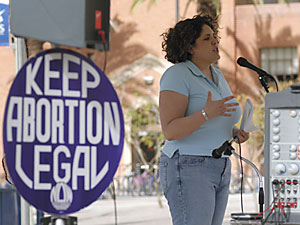 |
|
JOSH FIELDS/Arizona Daily Wildcat
|
Laila Sarah of Planned Parenthood of Southern Arizona speaks at a rally held on the UA Mall Saturday afternoon. The rally commemorated the anniversary of the Supreme Court case Roe v. Wade that made abortions legal in the United States.
|
|
|
By Zach Colick
Arizona Daily Wildcat
Monday, January 31, 2005
Print this
A woman's right to autonomy over her own body was discussed at the Arizona Coalition for Fairness Rally presented by the UA Students For Choice on the UA Mall Saturday.
The celebration commemorated the anniversary of the controversial Roe v. Wade decision giving women the right to an abortion. Speakers and bands tried to generate positive activity and a greater understanding of women's reproductive freedom to a crowd of more than 30 people.
Allison Baron, co-chair of the Students For Choice group, said the reason for the rally was to inform women on what their options are and how to step up and make their voices be heard.
Baron, a physiological sciences junior, said the 10 or so members in Students for Choice all have a strong passion for women's reproductive rights.
"It is a woman's right to choose. There's no reason why we should not have a choice in the matter," Baron said. "The government shouldn't interfere in our lives."
Baron said the current Bush administration is anti-abortion and anti-women, as the government is challenging sex education classes by trying to cut funding to those programs and telling women to practice abstinence.
"The White House has doubled abstinence education and is ready to elect more conservative Supreme Court justices," Baron said. "This could lead 30 states to not have abortion."
Allison Dumka, a political science sophomore, said she attended the event because the issue of abortion is relevant to all women's lives.
Dumka said the rights of women, which were not always there, were fought for and gained in the late 1970s and could now be taken away. She said women need to fight for their rights and cannot assume the freedom of choice will always be there for them.
"Some women think, 'This doesn't affect me, I'm not going to be stupid and get pregnant,' but it affects all women," Dumka said.
Dumka said some states require a 24- to 48-hour window between the initial appointment and when the abortion occurs. During this time period, the woman is read speeches and other testimonials about the risks of an abortion, many times swaying their decision and causing the woman to give birth to a baby she does not want to have.
"It's difficult for women to have abortions with this kind of propaganda," Dumka said.
Leila Sarah of Planned Parenthood of Southern Arizona, spoke about how access to contraceptive drugs are getting harder to come by.
Sarah said some pharmacists keep the contraceptive drugs behind the counter now instead of being readily available over the counter for young women.
"We're not being given a choice," Sarah said. "What they're saying is to essentially practice abstinence. We need to do everything we can to let these products stay on the market."
Sarah said people need to stay aware of what's going on in government and educate youth on the use of condoms so women can have a choice.
Alethea Arnold, a sophomore majoring in business economics and English, said she took part in the activity.
Arnold said she would be upset if the Bush administration made abortion illegal because there would be a lot more underground abortions.
"The only Bush I trust is my own," Arnold said.
However, Ryan King, a regional development freshman, disagreed with the event's aim and position.
"I don't believe in the right to choose and killing a human being," King said. "If you're going to have sex, deal with the consequences."
Robert Kent, a pre-business freshman, said he believes in a woman's right to choose.
"Women should be able to do what they want," Kent said. "It's their body and no one should have a say in such a private matter."
